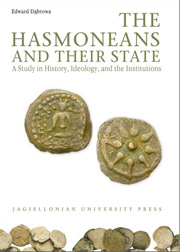Book contents
- Frontmatter
- Contents
- Introduction
- Abbreviations
- Part I Judea under the Hasmoneans (167–63 BCE)
- 1 Mattathias and Judah: In Defense of the Ancestors' Religion
- 2 Jonathan and Simon: A Strategy for Independence
- 3 John Hyrcanus: Securing Independence and the Rise of Expansionist Policy
- 4 Hasmonean Kings
- Part II The Institutions of the Hasmonean State
- Part III Society
- Conclusions
- Bibliography
- Index of Personal Names
- Index of Place Names
- Index of Ancient Sources
- Electrum - Volumes Published
- The Hasmonean State
2 - Jonathan and Simon: A Strategy for Independence
from Part I - Judea under the Hasmoneans (167–63 BCE)
Published online by Cambridge University Press: 05 September 2014
- Frontmatter
- Contents
- Introduction
- Abbreviations
- Part I Judea under the Hasmoneans (167–63 BCE)
- 1 Mattathias and Judah: In Defense of the Ancestors' Religion
- 2 Jonathan and Simon: A Strategy for Independence
- 3 John Hyrcanus: Securing Independence and the Rise of Expansionist Policy
- 4 Hasmonean Kings
- Part II The Institutions of the Hasmonean State
- Part III Society
- Conclusions
- Bibliography
- Index of Personal Names
- Index of Place Names
- Index of Ancient Sources
- Electrum - Volumes Published
- The Hasmonean State
Summary
The death of Judah Maccabee at Elasa (161) put a definite end to that stage of the Judean revolt which strove predominantly to restore religious rights and defend coreligionists. The nature of the struggle initiated by the Hasmoneans won them popularity and broad support. It still proved insufficient in the face of a military defeat that left the vanquished and rebel sympathizers facing a difficult trial of their faithfulness to its ideals and faith in a continued struggle. Bacchides' victory meant an increased influence over Judean affairs of the Hellenists, Judah's ideological and political adversaries (cf. 1 Macc 9:25; Jos. AJ 13.2). Now in control of the situation, supported by Bacchides, they proceeded to crack down on the defeated opponents (1 Macc 9:26; Jos. AJ 13.4–5). The repressive measures they took were a form of revenge for the wrongs they had suffered and for their lost property, and were meant to remove as many of Judah's associates as possible. A thorough political purge well served the interests of the group now in control over Judea, as it did the Syrian rulers. Elimination of rebel leadership could prevent possible future recurrence of insurgency. As an unexpected windfall, famine that struck Judea at the time helped the Hellenists strengthen their position. Supplied by Syrian authorities, the Hellenists were able to provide grain to all those who sided with them, which, hardly surprisingly, increased their popularity.
- Type
- Chapter
- Information
- The Hasmoneans and their StateA Study in History, Ideology, and the Institutions, pp. 42 - 66Publisher: Jagiellonian University PressPrint publication year: 2009



